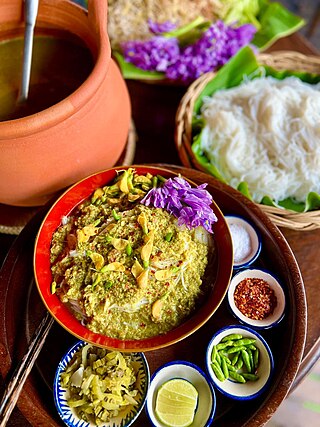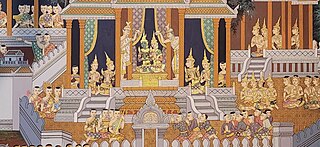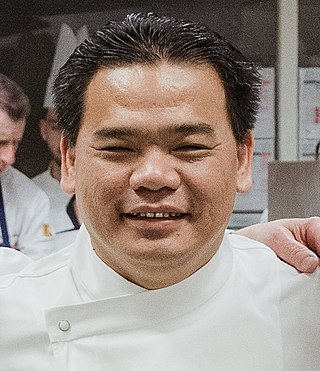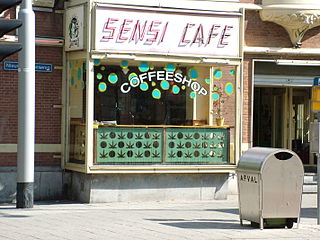
Phnom Penh is the capital and most populous city of Cambodia. It has been the national capital since the French protectorate of Cambodia and has grown to become the nation's primate city and its economic, industrial, and cultural centre. Before Phnom Penh became capital city, Oudong was the capital of the country.

A cannabis edible, also known as a cannabis-infused food or simply an edible, is a food item that contains decarboxylated cannabinoids from cannabis extract as an active ingredient. Although edible may refer to either a food or a drink, a cannabis-infused drink may be referred to more specifically as a liquid edible or drinkable. Edibles are a way to consume cannabis. Unlike smoking, in which cannabinoids are inhaled into the lungs and pass rapidly into the bloodstream, peaking in about ten minutes and wearing off in a couple of hours, cannabis edibles may take hours to digest, and their effects may peak two to three hours after consumption and persist for around six hours. The food or drink used may affect both the timing and potency of the dose ingested.

Cambodian cuisine reflects the varied culinary traditions of different ethnic groups in Cambodia. Central to Cambodian cuisine is Khmer cuisine, the nearly-two-thousand-year-old culinary tradition of the majority Khmer people. Over centuries, Cambodian cuisine has incorporated elements of Indian, Chinese, French, and Portuguese cuisines. Due to some of these shared influences and mutual interaction, Cambodian cuisine has many similarities with the cuisines of Central Thailand, and Southern Vietnam and to a lesser extent also Central Vietnam, Northeastern Thailand and Laos.

Kuyteav is a Cambodian noodle soup consisting of rice noodles with pork stock and toppings. Originating from Chinese Cambodian cuisine, it is now a popular breakfast dish across all of Cambodia. The kuyteav can be found at marketplace stalls, roadside vendors, restaurants and in shophouses across the country, and is distinguished by its clear broth and array of herbs, aromatics and other garnishes and condiments. A related dish is the Vietnamese hủ tiếu, which was introduced to Vietnam by Chinese Cambodian immigrants in the 1970s.

Noodle soup refers to a variety of soups with noodles and other ingredients served in a light broth. Noodle soup is a common dish across East Asia, Southeast Asia and the Himalayan states of South Asia. Various types of noodles are used, such as rice noodles, wheat noodles and egg noodles.

Bánh xèo is a crispy, stuffed rice pancake popular in Vietnam. The name refers to the sound a thin layer of rice batter makes when it is poured into the hot skillet. It is a savoury fried pancake made of rice flour, water, and turmeric powder. It can also be called a Vietnamese crêpe. Some common stuffings include pork, prawns, diced green onion, mung bean, and bean sprouts. Bánh xèo is often served with sides. Usually, some commonly added ingredients include leafy greens like lettuces or perilla leaves, other herbs as flavor enhancers like mint leaves and Thai basil, cucumbers, and pickled vegetables, usually carrots and radishes. Lastly, its dipping sauce is nước chấm. Elements of each side and sauce add to the fresh-tasting fried Bánh Xèo.

Media in Cambodia is largely unregulated and includes radio, television and print media outlets. Private sector companies have moved into the media sector, which represents a change from years of state-run broadcasting and publishing.

A banana fritter is a fritter made by deep frying battered banana or plantain in hot cooking oil. It is a common dish across Southeast Asia and South India.
Stéphane Delaprée is a well-known international artist resident in Cambodia and is known for his "Happy Painting", naive paintings combining humour, poetic, and realism.

Preah Sihanouk, also Sihanoukville, is a province (khaet) in southwest Cambodia on the Gulf of Thailand. The provincial capital, also called Sihanoukville, is a deep water port city and a steadily growing and diversifying urban center on an elevated peninsula.

Kep is the smallest province (khaet) of Cambodia covering 336 km2 (130 sq mi), with a population of 41,798. It is one of the newest Cambodian provinces, together with Pailin, Sihanoukville and Tboung Khmum, created by Royal Decree on 22 December 2008, which separated Kep Municipality & Damnak Chang'aeur District from the Kampot province, as well as adjusting several provincial borders. It is both the smallest and least populous province of Cambodia. The provincial capital is Kep and the province contains the Kep National Park.

Sihanoukville, also known as Kampong Saom, is a coastal city in Cambodia and the capital of Preah Sihanouk Province, at the tip of an elevated peninsula in the country's south-west on the Gulf of Thailand. The city has a string of beaches along its entire coastline and coastal marshlands bordering Ream National Park in the east. The city has one navigable river, the mangrove-lined Ou Trojak Jet, running from Otres Pagoda to the sea at Otres. Several thinly inhabited islands, under Sihanoukville's administration, are near the city.

Cannabis in Cambodia is illegal. This prohibition is enforced opportunistically. Many "Happy" restaurants located in Phnom Penh, Siem Reap and Sihanoukville publicly offer food cooked with marijuana, or as a side garnish.

Cannabis is illegal in Laos. However, a cannabis culture still exists in the country.
The COVID-19 pandemic in Cambodia was a part of the ongoing worldwide pandemic of coronavirus disease 2019 caused by severe acute respiratory syndrome coronavirus 2. The first imported case in Cambodia was detected in Sihanoukville on 27 January 2020. Although a number of imported cases and transmission to direct contacts were confirmed throughout 2020, no community transmission was detected until 29 November 2020. As of July 2021, Phnom Penh has been the most affected province with the majority of infections and deaths. Banteay Meanchey has the second-highest number of infections, whereas Kandal has second-highest number of deaths.

Luu Meng is a Chinese Cambodian chef, culinary author and hospitality entrepreneur. He is the CEO of Almond Group, director of Thalias Group, president of the Cambodia Tourism Federation, president of Cambodian Hotel Association, president of Cambodia Chef Federation, vice president of ASEAN Hotel Association and Cuisine Advisor of the Confrérie de la Chaîne des Rôtisseurs.

Cannabis tourism, also called marijuana tourism, is travel/tourism related to cannabis or incorporating cannabis use.

Khmer royal cuisine or Cambodian royal cuisine is one of the three types of Khmer cuisine, the other two being elite and rural cuisine. Khmer royal cuisine has evolved over the centuries with influences from India, China, Thailand, Vietnam and France.

There are various intersections of cannabis and the restaurant industry.















